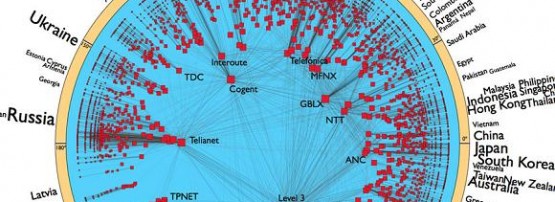
At the recent IETF90 I attended the ISOC Advisory Council (AC) meeting. This is a regular Friday get-together where- amongst other goals- ISOC staff get to engage with a broad range of cross-industry and related partners of ISOC, and showcase activities they have been undertaking.
Andrei Robachevsky presented on the routing manifesto. This is a new initiative which kicked off earlier this year, and encapsulates a set of principles which preserve the value of the commons in global routing.
At first glance, the manifesto is axiomatic: self-evident and obvious. And for many of the older routing engineers it has a “so what” quality. But I still believe its worth saying, and I believe ISOC has done a good thing promoting it. Here’s why:
Firstly, its simple. These are goals which anyone can understand. We’re well down a path of dealing with new entrants in routing configuration for whom English is a second language, and we need to be mindful of how to express goals in simple English to withstand the rigours of translation. These principles are going to cross the language barrier.
Secondly, it gets beyond the proscriptive to the why. The goals relate directly to the value of the global default-free zone. The emergence of significant communities of ‘acquired default’ routing where packets will be accepted for delivery even if the announced routes don’t exist has resulted in problems which relate to 1.1.1.0/24, an unusable netblock which has become ubiquitous in WiFi deployments in cafe and hotel nets, and the spoofed-source packetflows which form the building blocks of DDoS attacks on unrelated third parties.
Finally, Its encouraged a dialogue. Reactions from the routing community have been mixed, but have started conversations between players with quite different takes on the problem space.
Some of the reactions to the routing resiliency manifesto have been to the use of the word manifesto itself. ISOC is going to review and probably re-brand this under an acronym, because its less important what the document is called than what it says. The tradition in Europe of manifesto publishing in the arts and sciences is quite old, and well understood but may not have stood the test of time, or distance.
The views expressed by the authors of this blog are their own and do not necessarily reflect the views of APNIC. Please note a Code of Conduct applies to this blog.

Yes, a good initiative by ISOC. So any plans from anyone or APNIC to present something in upcoming meeting to gauge community response on this or as information to the community?
That’s a very good idea Aftab! I’m not sure if anyone from ISOC is on the agenda, but I’ll check with Andrei when he gets back from holidays and report back.
The picture (the internet globe?) is rather interesting. Is there a link to the full picture?
Hi Yi Chu,
Here’s a link to the full picture as uploaded.
Hi Yi Chu,
Read more about the image- Hyperbolic atlas of the Internet- here http://www.nature.com/ncomms/journal/v1/n6/fig_tab/ncomms1063_F3.html
Thanks for your interest.
Pingback: The IETF90 Technical Plenary | APNIC Blog